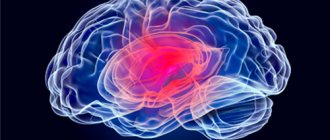Neurosis of the stomach and intestines often occurs due to stress and poor lifestyle. This means that most modern people are at risk. Delayed diagnosis will lead to progression of the disease and increased damage to health. The consequences can be serious weight gain, ulcers, chronic intestinal diseases and much more.
In this article we will talk about the symptoms and treatment of gastric neurosis. We will also try to find out what causes the disease and how to prevent it.
Why does the disease occur?
When we talk about the common causes of intestinal and stomach diseases, they are often caused by bacteria, hereditary predisposition, and acquired chronic pathologies.
But do not forget that the vagus nerve is involved in organizing proper gastric secretion. When it is at rest, secretion occurs normally and the person feels comfortable. But psychological shocks and past illnesses, as well as simply constant anxiety, can lead to serious problems.
Among the common causes of gastric neurosis are:
- Problems of a psychological nature. They arise when a person feels constant anxiety, is dissatisfied with himself, or experiences a tragic event. Psychologists note that neurosis can cause a break with a loved one, being in a negative environment in a team at work, or the loss of a relative.
- Wrong lifestyle. The nervous system suffers due to lack of sleep, poor work-rest balance, and constant severe stress.
- Nutrition problems. The gastrointestinal tract makes itself known when you eat a lot of fatty, heavy foods, consume a lot of sweets and starchy foods. Poor diet is another risk factor. To avoid getting sick, you should give up frequent snacking and balance your diet.
- Past illnesses. Many viral diseases, as well as problems with the stomach and intestines, quickly provoke neurosis. The problem appears against the background of gastritis, neoplasms, ulcers and other problems.
- Negative effects on the gastrointestinal tract. The disease can manifest itself after severe poisoning, as well as during intoxication, against the background of bad habits.
Treatment of gastric neurosis: the most effective and proven methods
So, treatment of gastric neurosis is a rather long process, the course of which must be monitored by a doctor. It is necessary to start it as early as possible, because in a very advanced form this pathology leads to much more serious complications and even other diseases - problems with the esophagus and stomach.
The very first advice that can be given to a patient is to visit a competent psychotherapist. He will give all the necessary advice on avoiding emotional stress and worries, and will also prescribe certain physical activities.
Diet therapy plays a certain role. It should be selected depending on the general acidity of the patient’s stomach. The peculiarity of diet therapy is that the transition from dietary food to a regular diet occurs smoothly and also covers a long period of time. You will need to abstain from hot, spicy and salty foods during treatment. It is also necessary to completely exclude from the diet foods that are prone to fairly rapid fermentation.
The patient will benefit from baths with the addition of mint, essential oils, and any medicinal herbs. It is necessary to take herbal infusions that have a strong sedative effect. Such as infusions of oregano, motherwort and valerian. Such plants perfectly normalize the state of mind and help overcome neurosis.
Symptoms of the disease
The disease begins to manifest itself at a fairly early stage, so examination using modern diagnostic methods allows you to choose the right treatment method and get down to business.
Neurosis of the stomach and intestines is manifested by the following symptoms:
- Constant feeling of hunger. It does not disappear even after a heavy meal.
- Bloating, increased gas production. May be accompanied by colic.
- Discomfort in the abdomen. There is pain, heaviness, and a pulling sensation.
- Heartburn. It occurs in the abdomen and can spread to the sternum area.
- Belching. Sometimes a person cannot control the urges. Belching is accompanied by loud sounds and an unpleasant odor.
- Aversion to food. Often, not only the smell, but also the sight of food can cause nausea and severe psychological rejection in a person.
Psychologists also note such signs as the manifestation of a chewing reflex even when there is nothing in the mouth. Patients complain of severe nervous agitation, problems with sleep, and panic attacks. Phobias may also appear. The head begins to ache and feel dizzy, blood pressure rises, and hypochondria is observed.
Diagnosis of gastroneurosis
Many signs and symptoms of gastric neurosis are identical to those that develop with gastritis.
Therefore, to correctly diagnose this disease, it is important to pay attention to the presence of psychological symptoms, such as rapid heartbeat, headaches, overexcitation, insomnia, panic attacks, phobia, hypochondria, etc. Characteristic signs of gastric neurosis in children are nervous vomiting, not accompanied by nausea. In adults, this disease often manifests itself in the form of anorexia (complete lack of appetite) or bulimia (a condition in which a person eats too much food). Both of these pathologies are dangerous and can ultimately even lead to death.
Our offers
Our clinic treats mental disorders in Moscow.
If you have symptoms of stomach neurosis, contact us. We employ experienced psychiatrists. They specialize in the treatment of psychosomatic diseases of various internal organs caused by psychological reasons. Our doctor will examine you, perform the necessary tests, after which he will make an accurate diagnosis and provide appropriate treatment. If necessary, a psychiatrist can visit your home.
Call by phone
What is bulimia
In essence, bulimia nervosa is gluttony. A person suffering from it is simply delirious about food, thoughts about it completely take over him: he cannot study, work, do anything. The patient gives up everything just to eat; he may steal food or take it out of the trash. While he is eating, he does not have any internal tension, but after that the individual has a fear that he will gain weight. And then all possible means are taken to prevent this: taking laxatives, inducing vomiting in various ways, enemas, diuretics and fat-burning drugs - cleansing the stomach brings relief.
Remember how in history lessons we were told about the many-hour feasts of Roman aristocrats. To clear their stomachs full of food and continue the feast, they used peacock feathers to induce vomiting, putting it into special vessels designed for this purpose. This, of course, is very far from the problem we are considering, but it is quite appropriate to mention this fact.
The individual also begins to train intensively, and such activities are compulsive (obsessive, coercive) in nature. Excessive sports activities, according to the bulimic, make it possible to get rid of excess calories received from food, and will also allow you to eat more.
Such measures do not lead to anything good, threatening numerous health problems and loss of attractiveness:
- due to the high acidity of vomiting, ulcers appear in the oral cavity, gums become sore, and teeth deteriorate and fall out due to enamel erosion;
- electrolyte balance and heart rhythm are disturbed;
- the body no longer has enough nutrients and minerals due to their leaching;
- the esophagus is damaged;
- salivation increases;
- the face swells as the salivary glands enlarge;
- kidneys and liver are damaged;
- various diseases arise;
- the psyche suffers;
- women's menstrual cycle is disrupted;
- frequent convulsions are observed;
- the skin dries out;
- bone density decreases;
- hair fall out;
- haunted by a feeling of chills.
Very often it all starts with another eating disorder - anorexia, in which a person tries to limit himself in food intake and goes hungry. He is driven by the desire to get an ideal (from his point of view) weight, to be slim. Moreover, quite often such an individual actually has normal body weight.
Abstaining from food leads to the fact that a person’s thoughts begin to revolve around food, and he breaks down, loses control of the amount of food consumed, absorbing it in huge quantities. In an attack of bulimia, a patient is able to receive up to 6 thousand kilocalories, when, for example, a woman from 19 to 30 years old with low physical activity needs 2 thousand kcal.
Some experts believe that bulimia and anorexia are not even “twin sisters,” but different stages of the same disease: first, fear of food due to weight gain, then obsessive thoughts about it, and again the return of the same fear. They classify bulimia as primary - independent, and secondary - a symptom of anorexia.
Treatment of esophageal spasm
Medication therapy involves the use of several drugs simultaneously. If a person has mental problems, then antidepressants are prescribed. This allows you to stabilize the emotional state of the patient, due to which the severity of unpleasant signs of the disease is reduced.
Most patients with normal mental health are prescribed sedatives; they help alleviate unpleasant symptoms and significantly reduce the number of spasms.
What other medications are used to eliminate unpleasant symptoms:
Reasons for the development of pathology
The main causes of gastric neurosis are:
- Leading an incorrect lifestyle. Lack of daily routine, constant stress, lack of healthy sleep, excessive physical and emotional stress.
- Poor nutrition, heavy consumption of junk food, dry snacks.
- Neoplasms, ulcers, gastritis.
- Negative influence of factors on the functioning of the gastrointestinal tract.
- Active development of diseases caused by the penetration of viruses into the body.
- Conflict situations both with oneself and with others.
As a rule, to eliminate stomach neurosis, it is enough to simply change your lifestyle and review your diet.
Traditional medicine recipes
As an alternative, you can use unconventional means that can help solve the problem:
- A simple recipe is to take a teaspoon of flaxseed oil on an empty stomach. The procedures are carried out daily, the oil is heated to room temperature. It is better to drink it 20-30 minutes before meals.
- Prepare a decoction of motherwort and valerian root, mix the ingredients in equal proportions, pour boiling water and leave for at least 2 hours. You can supplement the decoction with hops. This medicine will have a good sedative effect.
- Mix flax and anise seeds in equal proportions, grind them in a coffee grinder or use a blender. Pour the mixture with honey, let it stand for 2 days, stirring occasionally. The product can be consumed daily, 1 teaspoon.
- Herbal baths have good results. The procedures are carried out at home, using various herbs: mint, lemon balm, fir needles, hops. Such baths have a sedative effect and are taken before bedtime. You can replace herbal decoctions with essential oils: lavender, ylang-ylang.
University
→ Home → University → University in the media → Psychological “roots” of peptic ulcer disease
Stomach and duodenal ulcers develop due to stress. It turns out that it is impossible to cure with drugs? For complete recovery, emotional stress must be eliminated. But in the modern world this is unrealistic... Answered by Associate Professor of the Department of Polyclinic Therapy of BSMU, Ph.D. honey. Sciences, general practitioner and psychotherapist Anatoly Bliznyuk (back in Soviet times, the doctor studied the relationship between the psychological and clinical-functional characteristics of patients with duodenal ulcers and now continues his research - as part of scientific work on psychosomatic diseases): - Peptic ulcer disease refers to classic psychosomatic ailments, which are the result of the interaction of mental and physiological factors. Local and general mechanisms are involved. The first is a violation of the regulatory functions of the gastroduodenal zone, motility disorders and a decrease in mucosal resistance. General – high level of psycho-emotional stress. Modern medicine copes well with local mechanisms. There are powerful medications - proton pump inhibitors and histamine H2 receptor blockers (they effectively suppress the acid secretion of gastric juice), as well as strong antibiotics (they eliminate the flagellated parasite - Helicobacter pylori; many consider it the main culprit of the pathological process). But the stress factor, alas, is underestimated and usually remains unattended.
Patient portrait
A long time ago, when I was a local therapist in a clinic, I noticed that people with stomach ulcers, stubborn, difficult to scar, persistent for a long time, usually got it after a conflict situation or a powerful emotional shock. This is especially true for older women who have experienced the death of loved ones. In patients with duodenal ulcers (these are 4 times more common), the stress was not so pronounced, although long-lasting, associated with professional fulfillment or family problems. All patients were united by an urgent need for love, care and protection, which, unfortunately, they did not have due to various circumstances. This thirst for care can be compared to what a small child experiences when abandoned by his mother. But this “does not suit an adult”, and therefore the feeling of defenselessness and dependence is suppressed by them. Having not received the desired attention, a person strives to compensate for this with professional success, sports victories, and other achievements; he often sets high standards and goes overboard with the load. But even having achieved the goal, he does not feel satisfied. This category of patients has a very painful sensitivity to failures at work, loss of a high position, and negative assessments of their activities. An inadequate violent reaction to events entails the inclusion of local mechanisms for the development of the disease.
Between emotion and body
When a person has a need, an acceptor of the result of an action is immediately formed in the brain, perceiving and evaluating the result of the efforts made. To achieve the desired, muscular and other mechanisms are launched that organize actions in the desired direction. If everything worked out - emotions of satisfaction and pleasure. If not, disappointment, aggression, indignation. In the latter case, a corresponding vegetative discharge occurs: breathing and heartbeat become more frequent, and blood pressure rises. Possible reactions from the gastrointestinal tract - pain, heartburn, increased secretion of gastric juice, reflux of acidic contents from the stomach into the esophagus. The endocrine glands turn on - the adrenal glands intensively pump the blood with stress hormones, in particular cortisol and adrenaline. The pancreas “starts”, which means insulin increases. It also stimulates the production of gastric juice. Increased acidity is favorable soil for duodenitis, ulcers, gastritis (it is no coincidence that they are called acid-associated diseases).
When a person has high demands on himself and sets extreme goals that do not correspond to physiological capabilities, the hypothalamic-pituitary-adrenal system, which is responsible for resistance to stress, is activated. The stress response has been confirmed by animal experiments. The rats were subjected to immobilization stress—complete immobility; The thymus gland, which is responsible for cellular immunity, immediately decreased, hyperplasia of the adrenal cortex was observed, and gastroduodenal ulcers developed.
The connection between emotions and physiological processes is confirmed by the presence of peptides common to the gastroduodenal zone and the brain - substances involved in the self-regulation of body systems (endorphins, enkephalins, etc.). Therefore, the mood drops and changes occur in the gastrointestinal tract - motility, secretion, food digestion; appetite.
Ulcer from... demotion
Here's a case. A 37-year-old man had a periodically worsening stomach ulcer and was treated with medication twice a year. After a course of psychotherapy—working through a conflict situation in a group—the patient completely abandoned medications, and the pain stopped. An endoscopic examination of the gastrointestinal tract showed: there are scars in the stomach, no ulcers. No exacerbations were observed for 15 years. Another example. The military man was transferred to a lower position. He had many years of service behind him, he considered this unfair. In fact, translation became a powerful psychological trauma. After a couple of weeks, severe abdominal pain appeared. A fresh duodenal ulcer was diagnosed (some of the acute ulcers open literally the next day after a stressful situation). The man was treated with medication, the ulcer healed, but as soon as he returned to duty, it opened again. This time complicated by bleeding. The patient underwent gastric resection. After returning to work, he was again hospitalized with an anastomotic ulcer... The man turned to a psychotherapist in complete despair. A course of individual psychotherapy of 9 sessions was required (he refused group therapy), which included relaxation techniques, rational-emotive and hypnotherapy. The mental background of the severe course of the disease was revealed to the man. He did not immediately admit: his profession was everything to him; he wanted to constantly receive external confirmation that he was strong, successful and independent. And having lost his status, he experienced it as a life disaster. During therapy, the patient realized: life is not limited to success at work, especially in adulthood, when spiritual values are a priority. He has a wealth of experience, good intellectual baggage, he is organized and responsible, he has a lot of options to realize himself “in civilian life”, to be useful and interesting to his loved ones. The ulcer healed and a long-term remission was achieved.
It all starts with the desire to get to the bottom of things
An important condition for any psychotherapy is the patient’s awareness of his wrong attitudes and correction of his personal picture of the world. Unfortunately, few sincerely strive for this and show a willingness to open their souls, admit their own weakness, dependence, and serious internal problems. Advertising of pharmaceuticals and their abundance hinders the perception of the relationship between mental and physical factors: swallow a pill - and why get to the bottom of the problem by changing your worldview? The local mechanism for the formation of the disease is blocked, but incorrect attitudes and, as a consequence of this, periodically occurring or constant stressful situations and injuries remain. Therefore, today the so-called pathomorphoses, changes in the course of the disease. Instead of an ulcer, for example, GERD (gastroesophageal reflux disease) appears, which is characterized by the reflux of acidic stomach contents into the esophagus. For those suffering from GERD, one of the characteristic psychological reactions is a strong internal protest against an unpleasant situation. Classic psychosomatoses also include nonspecific ulcerative colitis, myocardial infarction, arterial hypertension, rheumatoid arthritis, bronchial asthma, neurodermatitis, hyperthyroidism... Psychosomatic pathology rather requires rehabilitation measures, the purpose of which is to harmonize a person’s worldview and self-perception. Elena Kleshchenok Medical Bulletin , January 31, 2013
Share
Treatment of nervous gastritis
Therapy for gastritis should be comprehensive. It involves strict adherence to the prescribed diet and taking medications recommended by a gastroenterologist. If the main cause is stress, then it is necessary to consult a psychotherapist and take sedatives (sedatives), preferably on a natural basis.
Patients are recommended to take Valerian officinalis preparations to treat stress due to gastritis. It not only has a calming effect, but also relieves spasms during attacks of stomach pain, improves appetite and promotes the regeneration of damaged mucous membranes. It is recommended to take Valerian in tablet form rather than as a tincture.
For herbal medicine for nervous gastritis, the medicinal plant elecampane is also used. It helps relieve pain and normalize the functional activity of the stomach. In pharmacies you can buy Mesi-Vit or Elecampane P tablets.
It is important to stabilize the psycho-emotional state in order to avoid the progression of pathology and the development of complications. Relaxation techniques are of great importance for getting rid of stress and gastritis directly associated with it. The ability to relax in a timely manner allows you to avoid stress, and consequently, relapses of gastritis.
The text was checked by medical experts: Head of the socio-psychological service of the Alkoklinik MC, psychiatrist-narcologist L.A. Serova.
CAN'T FIND THE ANSWER?
Consult a specialist
Or call: +7 (495) 798-30-80
Call! We work around the clock!
Diet for esophageal spasm
The key components of treatment are diet and lifestyle modification. As for nutritional rules, you will have to follow certain recommendations:
- You should eat food in small portions, often.
- The last meal is moved to 7 pm or taken 3 hours before expected sleep. It is better to avoid late-night snacks completely.
The following foods can trigger an attack:
- alcohol, chocolate and citrus fruits;
- tomatoes, fatty foods, coffee;
- carbonated drinks, as well as sour fruit drinks and juices are prohibited.
You will also have to quit smoking and lose excess weight (if any). This will help normalize the functioning of the gastrointestinal tract.
It is also not recommended to get carried away with coarse fiber, since it is difficult for the body to process. Apples and cabbage in any form are excluded from the diet.
Cold or hot food can trigger a spasm. Therefore, you will have to carefully monitor the temperature and take food warm.
An important role is given to compliance with the drinking regime. A person must receive sufficient water.










